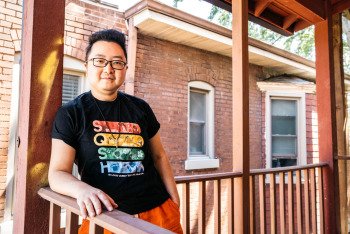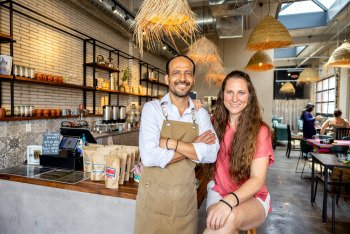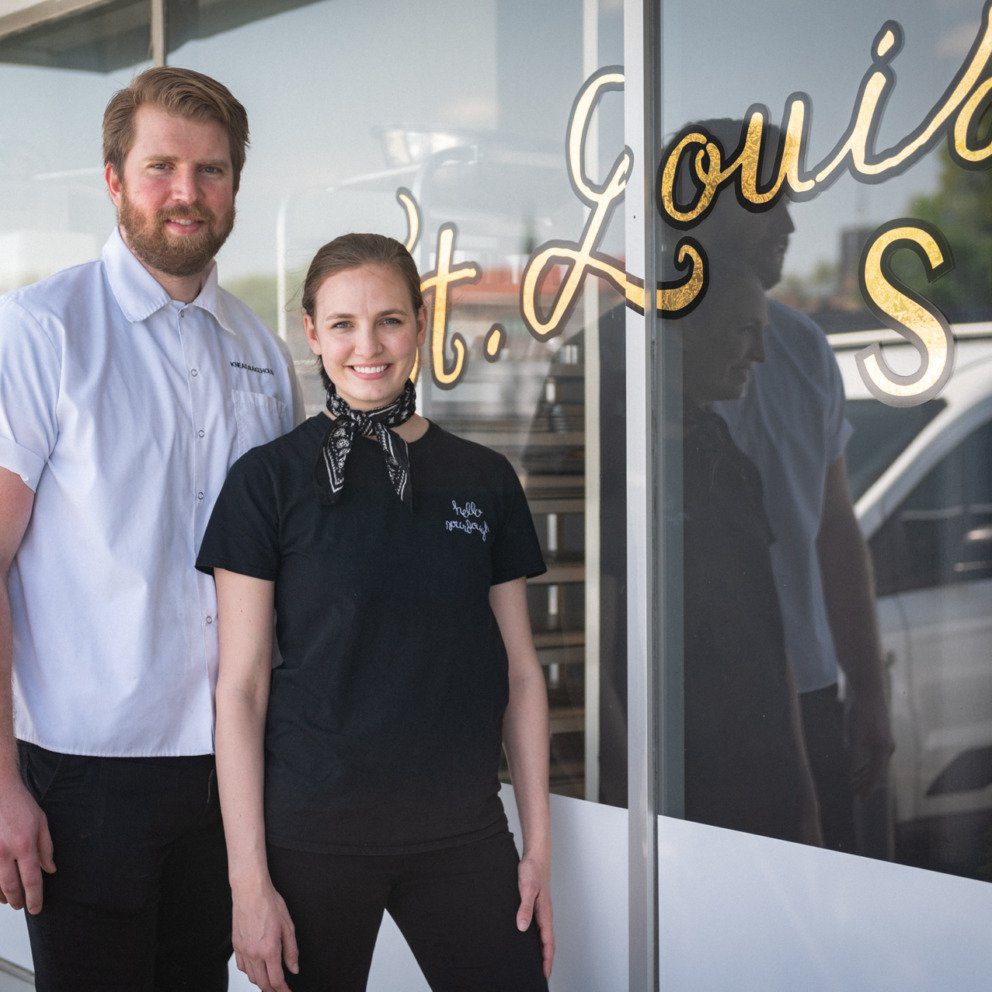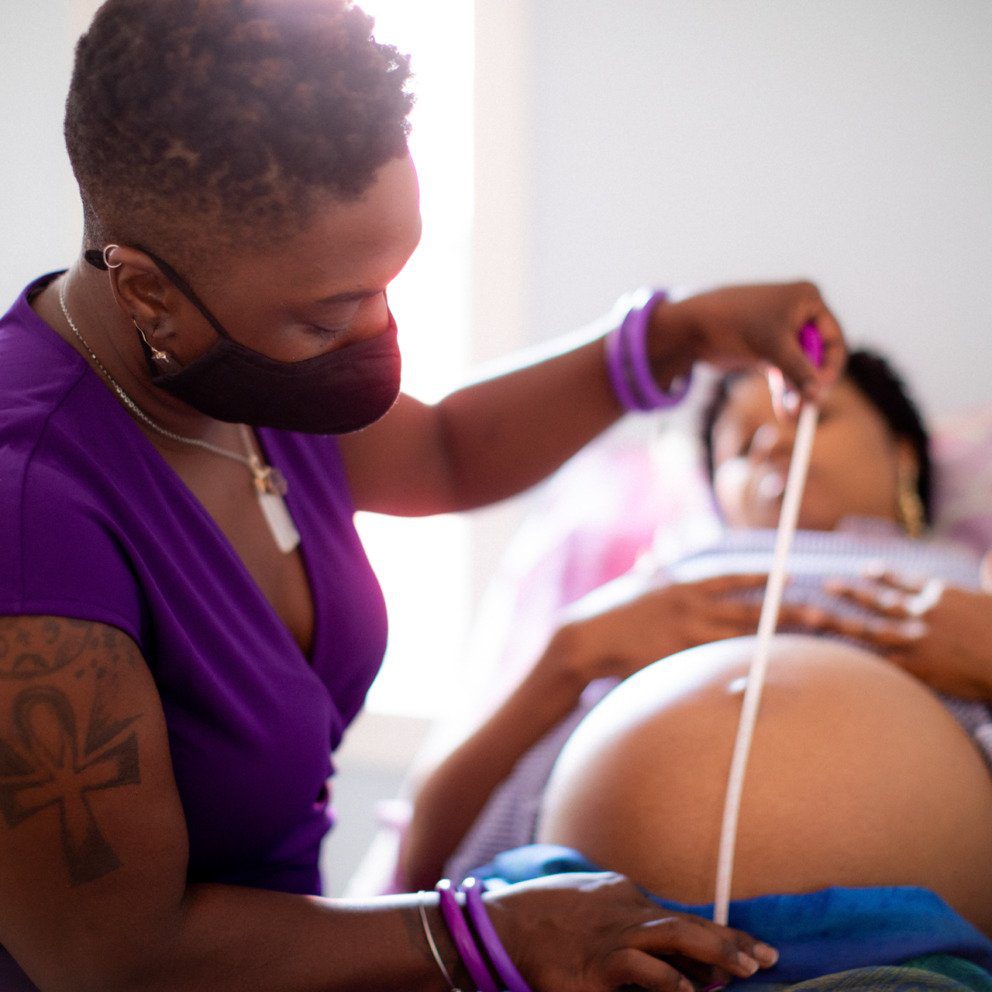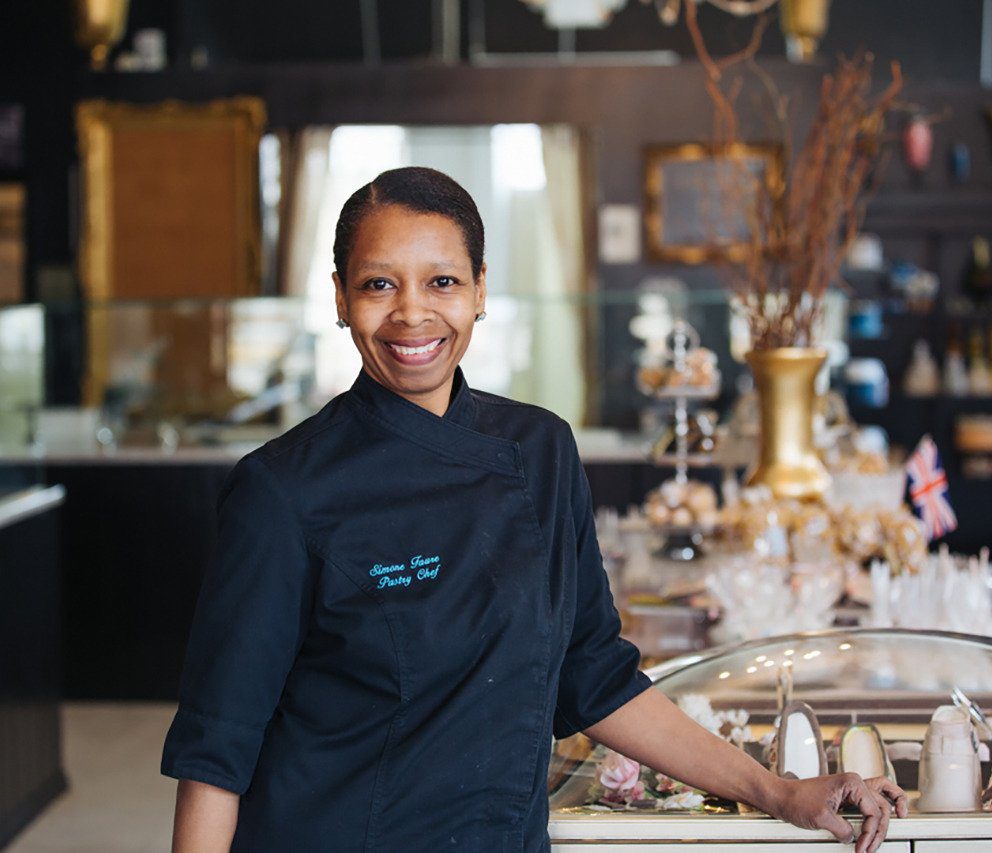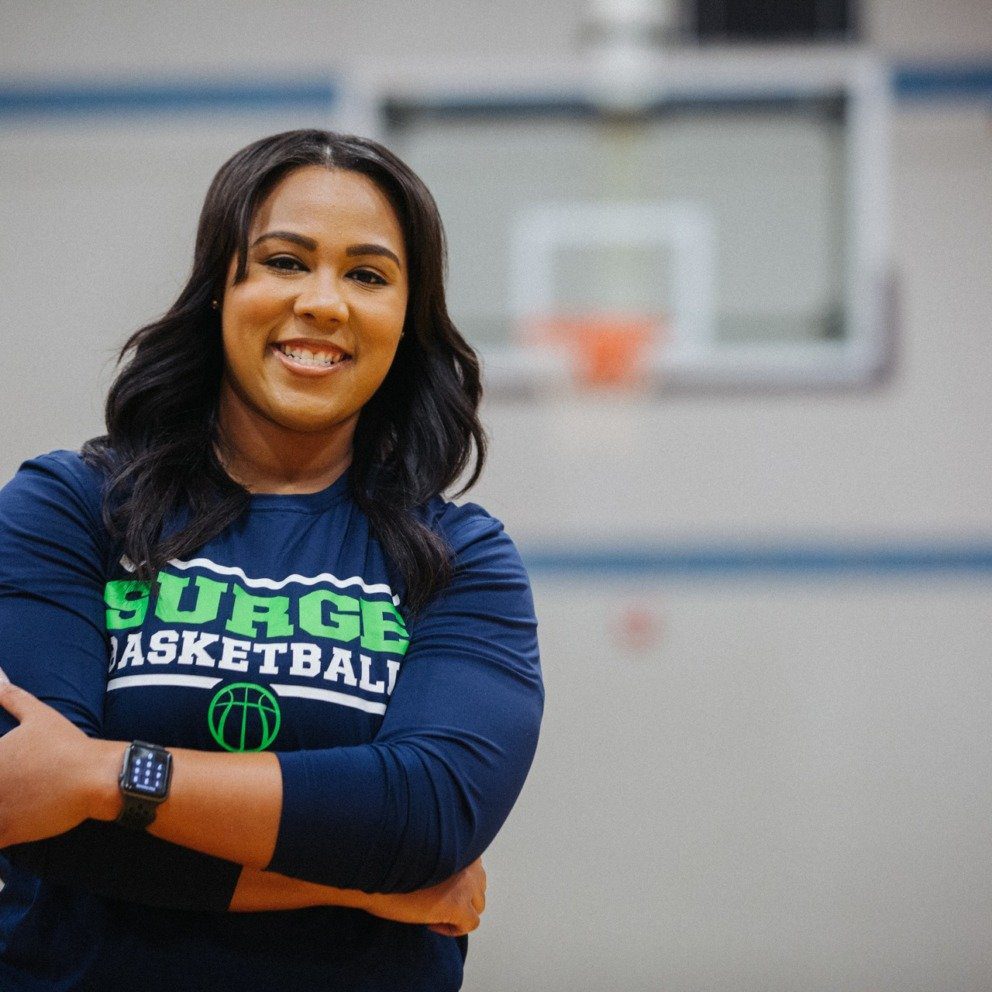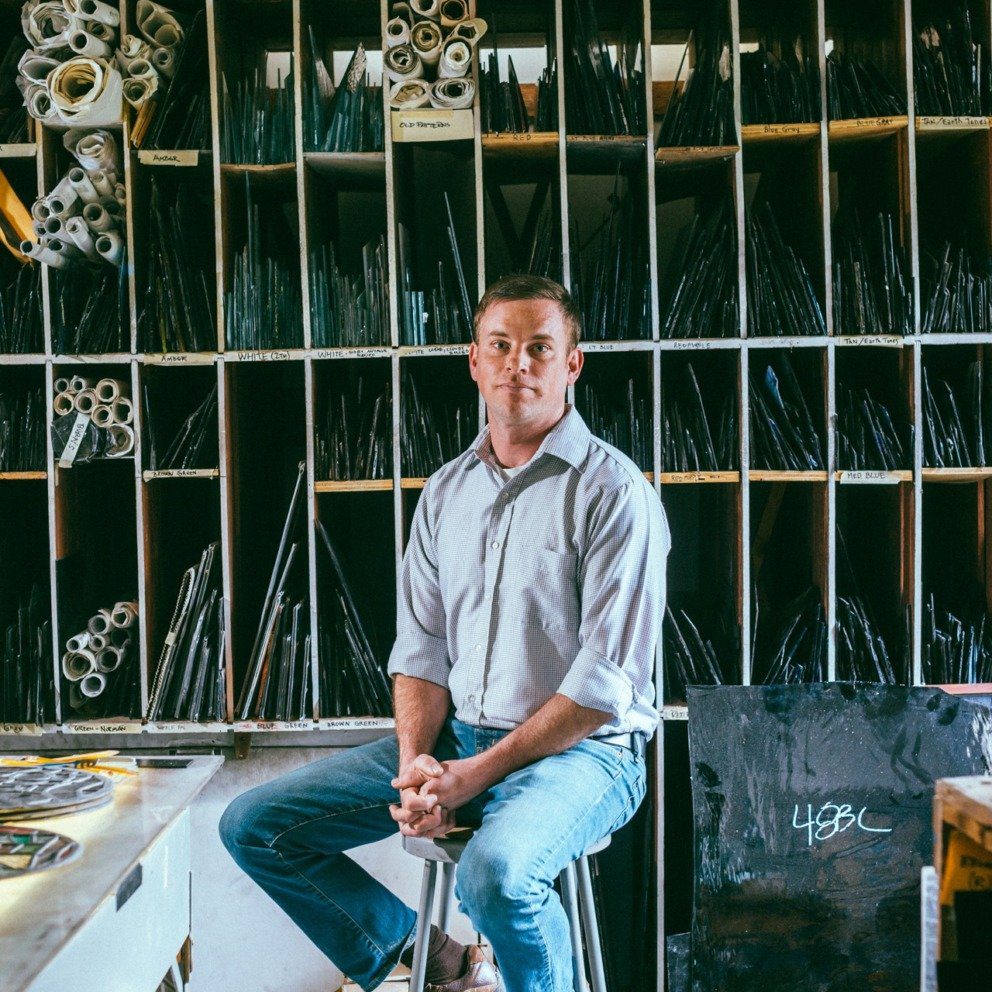In Full Bloom
At Oliver’s Coffee + Flower Bar in Maplewood, Olivia Ridgel's focus on creativity and inclusion have blossomed into a magical, uplifting space for fellowship and community.
Imagining and creating new realities and experiences isn’t new for Olivia Ridgel. A lifelong avid reader and writer, Ridgel says she used to devour one book per week in high school. Coffee shops often functioned as her home base, affording her a place to get lost in stories, yet none of them felt truly like home. Ridgel, whose family moved to Hazelwood from California when she was 12, says she always felt unfocused in shops with heavy, dark decor and clutter. In her mind, she yearned for a light, bright and cheerful space to spark her imagination and creativity.
“I’m affected by what things look like around me,” Ridgel says, “so if it’s dark, I’m just focused on the fact that it’s so dark; I feel like my brain is cluttered. So whenever I would go into coffee shops, something always took my attention away.”
Ridgel first piloted her dream in 2017 with a small cafe for youth, Oliver M’s, at her father’s church in Maplewood, New Destiny Worship Center. She says she has always felt a connection to Maplewood, and by September 2019, she expanded her dream into a full-fledged coffee and flower shop, C. Oliver Coffee + Flower Bar (renamed Oliver’s Coffee + Flower Bar in September 2020).
“I’ve always loved this little city,” she says. “Everything is within walking distance; you can ride your bike anywhere. It’s the coolest little town, and at least when we moved here, it was probably one of the most diverse neighborhoods in the St. Louis area. You just feel very comfortable here, no matter what you look like or who you are.”
Stepping inside Oliver’s today, Ridgel’s vision washes over you. The space is light, bright, airy and welcoming. She found early inspiration for the interior on Pinterest and Instagram, and you can immediately spot those influences. Shiny subway tile wraps the large, inviting coffee bar, while cool marble tables are flanked by blush pink chairs and luxurious emerald green crushed velvet sofas. Overhead, gold geometric light fixtures further illuminate the space, which is flooded with natural light during the day.
– Olivia Ridgel
Another statement piece in the space is the shop’s flower wall, a field of red, pink and orange artificial flowers from floor to ceiling. In addition to nodding to the shop’s fresh-cut flower selection, Ridgel says she envisioned guests posing in front of the flower wall for the perfect selfie — and she was right. You need only peek at the tagged photos on Oliver’s Instagram account to see just how many customers have delighted in the fresh, fun and colorful backdrop.
That’s another element of Oliver that sets it apart: Ridgel not only embraces customers taking selfies and snapping food and drink photos in her shop, she encourages it. She wants to foster an inclusive and welcoming space for all guests, but the flower wall was also a savvy business move, as it affords her free publicity on social media.
“You can come into the shop, and no matter what angle you’re taking a selfie, it’s going to look cute behind you,” Ridgel says. “One of my main goals was when people come in, they feel like they can be themselves one-thousand percent. So if you are the kind of person who takes selfies with their coffee, or takes pictures of your coffee in front of you, I want you to feel like you can totally do that and not be embarrassed. Me and my sisters are such selfie people, and we hate going to places where we’re having fun with Instagram and people are looking at us. This is the time we’re living in — why not just do what you want to do?”
With an eye for detail and rich aesthetics, Ridgel has woven the shop’s color palette into its menu as well. The drink menu includes strawberry milk used to make perfect pale pink lattes, including The Lola, a combination of chai and strawberry milk. Although the strawberry-milk lattes fit the shop’s colorway, they were created to achieve a different goal.
“I know that Maplewood has a lot of families — we have like a high school and an early childhood center — so I want parents to come in with their kids,” Ridgel says. “And I want their kids to feel like they’re drinking a latte with their parents, you know? I always used to love that, when I used to go to Starbucks with my mom when I was a kid, she would order something and then order us something that looked just like her drink, but with no caffeine. I always felt so grown doing that, so I created the Strawberry Mocktte, which is literally just strawberry milk and chocolate steamed in a coffee cup.”
The kid-friendly Strawberry Mocktte inspired Ridgel to try adding espresso to the drink for adults, which resulted in the shop’s Powder Pink Mocha, followed by The Lola, a strawberry chai tea latte. Other signature sips include the Oat Milk Cinna Mocha, made with cinnamon, and Oliver’s Tonic, a tart drink made with espresso, cherry and tonic water. Ridgel sources local roasts from Coma Coffee in Richmond Heights to blend the shop’s coffee drinks.
Just as Ridgel aims to present a welcoming, inclusive space for all guests to enjoy, she also wants people to know that Oliver’s embraces every type of coffee drinker. “If you come to the coffee shop and you order, let’s say, a latte with tons of caramel, we won’t judge you on your coffee,” she says with a laugh. “Order your coffee as sweet as you want.”
Soon Oliver’s will introduce its first hot food menu to complement the baked goods it sources from around town. Customers will be able to order food to go in a socially distanced environment.
We were on track before COVID-19 to add food,” Ridgel says. “That’s something that we’re definitely moving toward, and the goal is that it’ll be just as aesthetically pleasing as the cafe and the drinks that we offer. We want to have a really nice brunch-y menu — things like Blood Orange Oatmeal, which looks mind-blowingly gorgeous with fresh blood oranges surrounding the side. So we’ll have breakfast food and also light lunch food — pretty salads, soups.”
The sunny and inspiring cafe has proven to be a community hub, as well, and not just for beautiful cups of coffee. When training her staff, Ridgel aims to address systemic inequities in the hospitality industry, namely negative personal experiences she has had in restaurants and cafes feeling unheard, unseen or unwanted as a Black woman.
“I’ve been to plenty of coffee shops in St. Louis, and I would walk in or me and my sisters would walk in, and we just do not feel welcome at all,” Ridgel says. “And it feels really awful. That’s the thing, a lot of people of color, a lot of Black people, are used to walking into a space and not feeling accepted. I was just interviewing someone for a barista position, and I was telling her, ‘It’s very important that when every customer walks in that they’re greeted and they feel loved, accepted and heard. But especially when anybody of color walks in… If you’re busy or if you’re stressed, please break through that and greet them, because we are so used to walking into a place, and we aren’t greeted. And I would hate for anyone to feel that way.”
This is just one of many challenges and inequities Ridgel has worked to address and overcome as a small business owner. The cafe had only been open for six months when the COVID-19 virus began spreading across the St. Louis area. Ridgel didn’t miss a beat, immediately pivoting operations to serve drinks and food in single-use cups and packaging. Employees continue to wear masks and adhere to social distancing, and customers are asked to do the same. Still, the early days of the pandemic took a toll on the business, leading to reduced hours, which even then, Ridgel says, were solely to make sure her staff could earn wages and tips.
At first Ridgel worried that customers wouldn’t turn up, yet although Oliver’s was young, it had clearly already captured an audience, even if it was a small one. “This was our first year of business, so we didn’t really have a lot of clout,” Ridgel says. “When the quarantine happened, it was really hard. Really, really hard. We had our faithful customers, so we were surviving off of our regulars that live in the area. My husband and I had savings, thank god, but my husband is a barber, so we were actually both out of making money for a period.”
What ultimately saved the business, Ridgel says, was expanding and proudly broadcasting the shop’s dedication to equity and inclusivity. In late May and early June, following the police killing of George Floyd in Minneapolis, Minnesota, a new civil rights movement mobilized in America, and with it came a focus on supporting Black-owned businesses.
“What happened to George Floyd… it was the saddest thing I’ve ever seen in my entire life,” Ridgel says. “It jolted me. I felt like, ‘What am I doing to support this movement? How can I do something? How can I do my own little protest?’ So I decided to get this white window marker that I have and put ‘Black Lives Matter’ and ‘Black-owned business’ on my windows.”
Even as Ridgel was called to show public support for the Black Lives Matter movement, some members of her family expressed concern. Oliver’s is very much a family business, Ridgel says, and her parents, who grew up in a time well before Black Lives Matter was a rallying cry for racial justice and equity in America, were worried for their daughter.
“So I called my parents and said, ‘I just want to let you know: I don’t know if you’re going to like it, but I did it,’” Ridgel says. “I didn’t know if people would come and support us knowing that, but I told my parents, ‘I have to do my own little protest, and I really feel like people are going to want to support me.’ And they strongly felt the opposite of that. They were scared that I would lose the business and people would stop supporting me. I told them, ‘I understand, but I believe strongly that this is something I have to do.’”
The response from the community was immediate and overwhelmingly positive, Ridgel says. “As soon as I put my sign on the windows outside, business exploded,” she adds. “That was such a blessing, because no one really knew too much about us. From there, business has been consistently amazing.”
For Ridgel and her family, the response was more than a show of financial support — it was acceptance. That was especially emotional for her family, Ridgel adds. “My mom is Black and my dad is Mexican, and they grew up never experiencing peer acceptance,” she says. “That’s something that most people of color don’t grow up feeling. So for them to have felt almost like a big community hug, that was just such an amazing thing to experience.”
In that same spirit, Ridgel also hopes to further effect change in the coffee industry, which lacks diversity. She understands the critical role that representation plays in creating that change, and as Black woman running a successful business in a predominantly white industry, that means being a role model for other women and entrepreneurs of color.
“I get a little emotional when I think about how much it means to be a Black business owner, to be a Black business woman,” Ridgel says. “It’s an honor to be a voice that someone would listen to or that other people would look up to, like, “If she can do it, I can too.’ It’s an honor to be in that position. I understand how special it is to be a Black business owner, and I’m sure every Black business owner in America can understand that too and feels that, too. It’s just like, ‘Wow, I’m making a difference.’ It feels really good. I’m really honored to talk about it and be one of the faces in this movement.”
What started as a small coffee shop in her father’s church has now evolved into a community hub — sanctuary and fellowship begetting new sanctuary and fellowship — as bright, beautiful and inspiring as its founder and her original vision. Oliver’s proves that if you seek to carve out a space for yourself in the world, you just may create one that’s just as needed and sacred for others, too. Ridgel says:
“It’s nice for people to have a place where they feel like they totally belong.”
Join the Story
- Follow Oliver’s Coffee + Flower Bar on Instagram.
- Want to support Black-owned businesses? Check out the directory on For The Culture STL.

